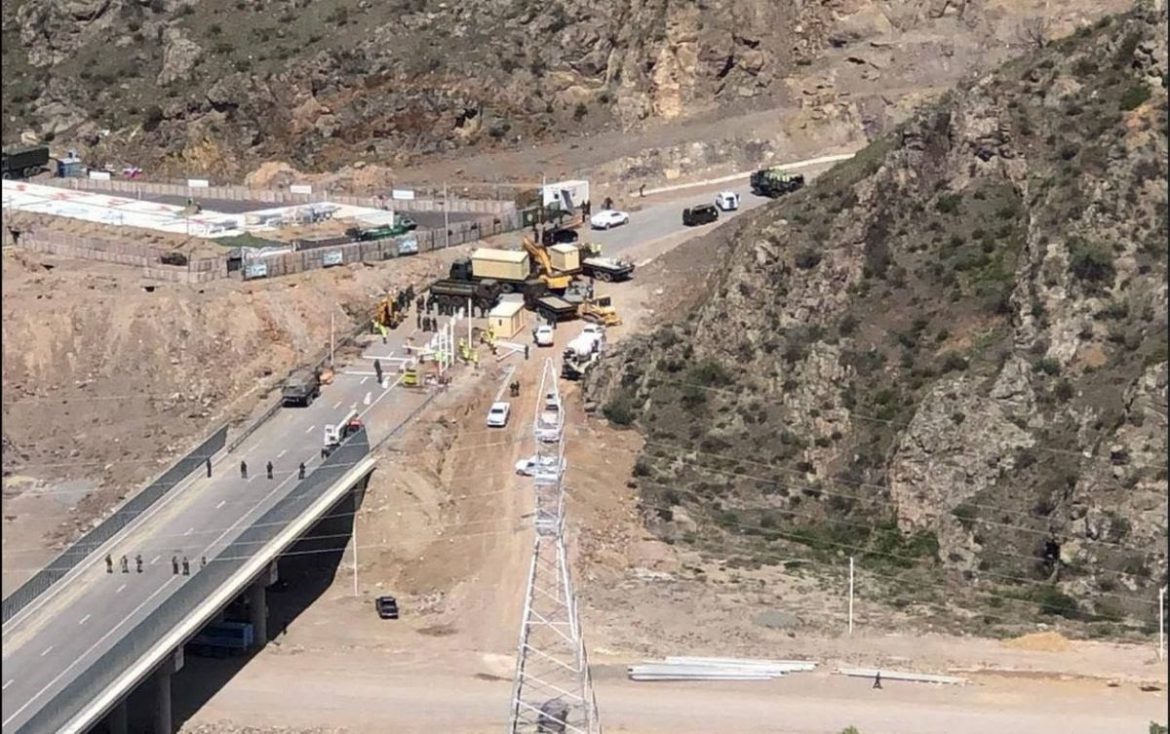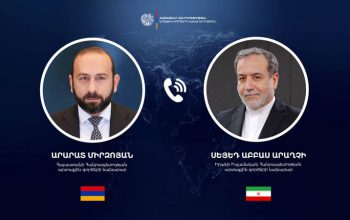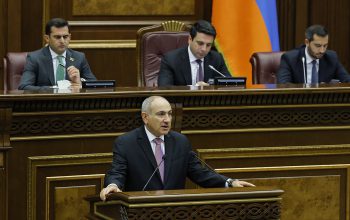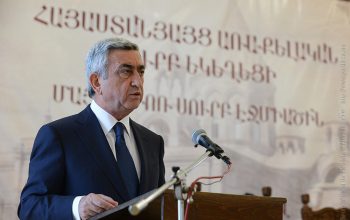By Lillian Avedian, The Armenian Weekly
Humanitarian aid shipments to Artsakh have been disrupted by Azerbaijan’s installation of a checkpoint along the Berdzor (Lachin) Corridor.
Artsakh authorities announced that humanitarian assistance delivered by Russian peacekeepers from Armenia to Artsakh could not be transported for three days following the creation of the checkpoint. On April 25, Artsakh authorities said that food shipments had been “somewhat restored.”
The transfer of 28 patients from Artsakh to medical institutions in Armenia was also barred by the establishment of the checkpoint. The patients include a pregnant woman whose expectant baby will require cardiac surgery and a nine-year-old with leukemia.
On April 23, Azerbaijan set up a checkpoint along the Berdzor Corridor, the sole route connecting Armenia and Artsakh, and closed the Hakari bridge at the entrance to the corridor near Armenia’s border. Russian peacekeeping forces stationed near the bridge did not intervene.
Azerbaijani protesters posing as environmental activists have closed the Berdzor Corridor since December 12, 2022, barring the movement of civilians or essential goods. Only vehicles belonging to the Russian peacekeeping mission in Artsakh or the International Committee of the Red Cross (ICRC) have been able to travel along the corridor. The ICRC has transported patients from Artsakh to Armenia for medical assistance since the start of the blockade. Yet the establishment of a checkpoint has tightened the blockade on Artsakh.
“It is obvious that by setting up a checkpoint, Azerbaijan is trying to give new impetus to its policy of ethnic cleansing of Artsakh in an environment of complete impunity and permissiveness,” the Artsakh Foreign Ministry said. “Not only does the leadership of Azerbaijan not hide its genocidal actions, but also announces them in advance without any condemnation or opposition from the international community.”
The installation of a military checkpoint violates the trilateral ceasefire agreement signed by Armenia, Azerbaijan and Russia ending the 2020 Artsakh War. Under the terms of the agreement, Russian peacekeepers were deployed to the Berdzor (Lachin) Corridor to ensure the connection between Armenia and Artsakh. The agreement states that “Azerbaijan guarantees traffic safety along the Lachin Corridor of citizens, vehicles and goods in both directions.”
The Ministry of Foreign Affairs of Azerbaijan defended the move in a statement, calling it a “legitimate national security decision.” It accused Armenia of using the Berdzor Corridor to transport military weaponry and personnel to Artsakh.
Azerbaijani authorities have long accused Armenia, as well as the Russian peacekeeping forces stationed in Artsakh, of using the Berdzor Corridor to deliver military equipment. They have not provided any evidence for this claim. Azerbaijani leadership has cited this accusation to justify previous escalations and military advances in Artsakh in the past months.
Azerbaijan’s Foreign Ministry denied that its government had violated the ceasefire agreement. It said that installing a border checkpoint “does not create changes in the traffic regime on the road.” It also denied that the Berdzor Corridor has been under blockade since December, stating that there are “appropriate conditions for transparent, safe and orderly passage” for the Armenians of Artsakh.
Artsakh authorities have directly called on Russia to prevent the creation of a checkpoint along the Berdzor Corridor. The corridor falls under the control of Russian peacekeepers, who were in close proximity to the Hakari bridge at the time of its closure by Azerbaijani forces.
The Artsakh Foreign Ministry said that it expects an “unequivocal and adequate response and effective measures” from the wider international community and “first of all, the Russian Federation.”
Advisor to the Artsakh State Minister Artak Beglaryan was even more direct, stating that Azerbaijan had been able to install a checkpoint because of the failure of the Russian peacekeeping forces to prevent the blockade.
The Ministry of Foreign Affairs of Armenia further called on Russia to “finally fulfill the obligation” under the ceasefire and end the blockade of the Berdzor Corridor. Armenia’s Foreign Ministry also called on the United Nations to “take effective steps toward the unconditional implementation of the decision of the ICJ [International Court of Justice].”
On February 22, the ICJ ruled that Azerbaijan must guarantee free movement along the Berdzor (Lachin) Corridor.
Russia’s Foreign Ministry did not mention the checkpoint in a statement it released this week expressing “great concern over the situation in Artsakh.” The statement repeatedly appealed to “both sides,” calling on both Armenia and Azerbaijan to abide by the ceasefire agreement. It called unacceptable any steps toward “the unapproved modification of the mode of operation of the Lachin Corridor or attempts to use it for purposes not meeting the peaceful agenda.”
The United States and France released sharper statements, criticizing Azerbaijan’s establishment of a checkpoint on the Berdzor (Lachin) Corridor. They both called for free movement of people and commerce along the route.
The Parliamentary Assembly of the Council of Europe announced this week that its rapporteur on “addressing the humanitarian consequences of the blockade of the Lachin Corridor,” Paul Gavan, will visit Armenia, Azerbaijan and Artsakh to document the situation along the corridor.
“Azerbaijan alleges systematic and large-scale misuse of the Lachin road for illicit purposes, contrary to the Trilateral Statement of 10 November 2020, which it claims constitute security threats. Without accessing the area, it is not possible to verify these claims,” Gavan said. “On the other hand, the suffering of the inhabitants in Nagorno-Karabakh, and the resulting serious humanitarian crisis, has already been well-documented.”




